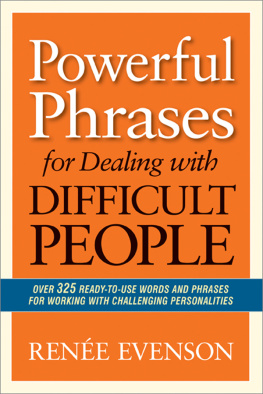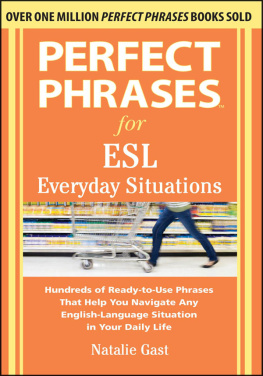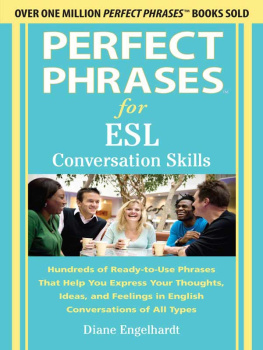PERFECT PHRASES for CONFLICT RESOLUTION
Hundreds of Ready-to-Use Phrases for Encouraging a More Productive and Efficient Work Environment
Lawrence Polsky and Antoine Gerschel


Copyright 2011 by The McGraw-Hill Companies, Inc. All rights reserved. Except as permitted under the United States Copyright Act of 1976, no part of this publication may be reproduced or distributed in any form or by any means, or stored in a database or retrieval system, without the prior written permission of the publisher.
ISBN: 978-0-07-176042-3
MHID: 0-07-176042-3
The material in this eBook also appears in the print version of this title: ISBN: 978-0-07-175616-7, MHID: 0-07-175616-7.
All trademarks are trademarks of their respective owners. Rather than put a trademark symbol after every occurrence of a trademarked name, we use names in an editorial fashion only, and to the benefit of the trademark owner, with no intention of infringement of the trademark. Where such designations appear in this book, they have been printed with initial caps.
McGraw-Hill eBooks are available at special quantity discounts to use as premiums and sales promotions, or for use in corporate training programs. To contact a representative please e-mail us at bulksales@mcgraw-hill.com.
Trademarks: McGraw-Hill, the McGraw-Hill Publishing logo, Perfect Phrases, and related trade dress are trademarks or registered trademarks of The McGraw-Hill Companies and/or its affiliates in the United States and other countries and may not be used without written permission. All other trademarks are the property of their respective owners. The McGraw-Hill Companies is not associated with any product or vendor mentioned in this book.
TERMS OF USE
This is a copyrighted work and The McGraw-Hill Companies, Inc. (McGraw-Hill) and its licensors reserve all rights in and to the work. Use of this work is subject to these terms. Except as permitted under the Copyright Act of 1976 and the right to store and retrieve one copy of the work, you may not decompile, disassemble, reverse engineer, reproduce, modify, create derivative works based upon, transmit, distribute, disseminate, sell, publish or sublicense the work or any part of it without McGraw-Hills prior consent. You may use the work for your own noncommercial and personal use; any other use of the work is strictly prohibited. Your right to use the work may be terminated if you fail to comply with these terms.
THE WORK IS PROVIDED AS IS. McGRAW-HILL AND ITS LICENSORS MAKE NO GUARANTEES OR WARRANTIES AS TO THE ACCURACY, ADEQUACY OR COMPLETENESS OF OR RESULTS TO BE OBTAINED FROM USING THE WORK, INCLUDING ANY INFORMATION THAT CAN BE ACCESSED THROUGH THE WORK VIA HYPERLINK OR OTHERWISE, AND EXPRESSLY DISCLAIM ANY WARRANTY, EXPRESS OR IMPLIED, INCLUDING BUT NOT LIMITED TO IMPLIED WARRANTIES OF MERCHANTABILITY OR FITNESS FOR A PARTICULAR PURPOSE. McGraw-Hill and its licensors do not warrant or guarantee that the functions contained in the work will meet your requirements or that its operation will be uninterrupted or error free. Neither McGraw-Hill nor its licensors shall be liable to you or anyone else for any inaccuracy, error or omission, regardless of cause, in the work or for any damages resulting there from. McGraw-Hill has no responsibility for the content of any information accessed through the work. Under no circumstances shall McGraw-Hill and/or its licensors be liable for any indirect, incidental, special, punitive, consequential or similar damages that result from the use of or inability to use the work, even if any of them has been advised of the possibility of such damages. This limitation of liability shall apply to any claim or cause whatsoever whether such claim or cause arises in contract, tort or otherwise.
Contents
Acknowledgments
Anne Bruce, your continued support and enthusiasm for our work is an inspiration. Your energy and bigheartedness continually amaze us. We are so grateful to have you as our guide, mentor, coach, friend, sister, and head cheerleader! This book would not exist without your support.
Thank you, Brian Foster, Mary Therese Church, and Lisa Stracks for your continued trust in our writing, for giving us just the right amount of direction to keep us on track, and for your editing. We have truly been in good hands! It has been a privilege to work with you and your team once again.
To our customers, thank you for so generously inviting us into your world! We learn daily from you and your organizational challenges. These experiences are the foundation of everything we do professionally and of many of the insights we share in this book.
Mark Kaplan, thank you for your continued insights into handling the most touchy of conflicts, particularly when long-held biases and discrimination are at play.
Thank you, Robin Famiglietti, Jim Higgins, Abha Mehta, Mediators without Borders, Mike Michalewicz, Barry Nobel, and Shelly Bernstein, for the stories, questions, and examples that have encouraged us along the way.
To Teresa, Gretta, Zach, family, and friends, who are patient with me when I dont have the patience or skill to practice what we preach. Thank you for your generosity of spirit. Your love and support enable me to become a better person A special thank-you to Wilson Tilleymentor, coach, and friendwho taught me the power of being open and honest in relationships. Everything I know about conflict resolution is rooted in your teaching. Your example proves irreplaceable to this day, both inside and outside of the workplace. Also to Bob Schachat, Nancy McManus, Steve Kleitzel, Lulinda Lloyd, Susan Mann, and all the others who frequented The Institute for Human Development in beautiful Charlemont. Without you, I could not have learned firsthand the ins and outs of bridging differences.
Lawrence
To Nomie, thank you for your partnership, your inspiration, and your patience. To Misha, Ron, and Giulia, I wish this book becomes a way for you to look at conflicts as an opportunity to grow personally and within the relationships you have. And, since you know me better than most readers, Do what I say you should do, not what I do!
Antoine
CHAPTER 1
What Is Conflict Resolution?
There are two types of conflicts, particularly during any kind of change. The first well call direct conflict. This is when it is clear there is a difference of opinion, including:
 Your perception of the situation is at odds with another persons.
Your perception of the situation is at odds with another persons.
 Your point of view is at odds with someone elses.
Your point of view is at odds with someone elses.
 Your needs are at odds with another partys.
Your needs are at odds with another partys.
The second type of conflict involves situations where bad feelings develop over time and create a barrier to relationships and productivity. We call this latent conflict. This kind of conflict can result from a number of causes, such as one person not handling the initial situation well right away, a lack of skills on the part of one or more people in addressing the situation, or even the difficult personality of one or more people involved.
Why Do We Avoid Conflict?
At some point, everyone avoids conflicts at work, for reasons both good and bad. Think of a conflict you are currently avoiding. Perhaps the conflict has been lingering for a while, or maybe you think you can continue to do your work without resolving it. Whatever the case, something about this particular conflict is making you avoid getting it resolved. Some possible causes for avoiding resolution are that the conflict is:







 Your perception of the situation is at odds with another persons.
Your perception of the situation is at odds with another persons.